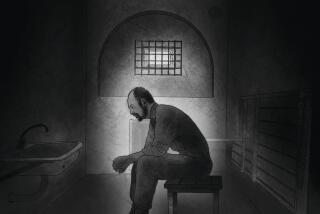Gorbachev Gets Appeal for Bolshevik Stalin Executed : Widow Seeks Bukharin’s Rehabilitation
- Share via
MOSCOW — The widow of Nikolai I. Bukharin, a leading Bolshevik who was executed in the last of the Stalin show trials, has asked Soviet leader Mikhail S. Gorbachev for a full Communist Party rehabilitation of her late husband.
Excerpts from the letter of Anna M. Larina, along with her recollections of Bukharin’s relationship with Josef Stalin, were printed Sunday in the current issue of Ogonyok, an outspoken weekly magazine.
Larina, now 73, said she was complying with a final plea from Bukharin to clear his name by requesting Gorbachev to take up the issue of posthumous exoneration for his alleged crimes.
Gorbachev said in a Nov. 2 speech that Stalin was guilty of “unforgivable” crimes and mentioned Bukharin’s name as one of the victims of false charges.
In the communication to Gorbachev printed in Ogonyok, Larina said that Bukharin made the request before leaving for a meeting of the Communist Party Central Committee in February-March, 1937, that led to his expulsion from the party and decided his fate. He was executed on March 14, 1938.
“Feeling that he would never return, he asked me to keep fighting for his posthumous rehabilitation,” she wrote.
“Tortured by investigations, horrible, inexplicable confrontations, very weak from a hunger strike as a protest against these horrible accusations, Bukharin fell on his knees in front of me and begged me not to forget one word from his letter to a younger generation of the party and asked me to struggle for his rehabilitation,” she said.
Larina, the mother of their infant son, named Yuri Larin after her father, said she swore an oath to carry out Bukharin’s last request.
Bukharin’s letter, long known in the West, described his “helplessness before a hellish machine . . . a degenerate organization of bureaucrats.”
The Ogonyok article said that Gorbachev’s citation of V. I. Lenin’s praise of Bukharin as a Communist Party favorite was the first positive mention of him in 50 years in the Soviet Union.
A key figure among the Soviet Union’s Old Bolsheviks, Bukharin was a major Marxist theoretician and economist. He worked closely with Lenin, founder of the Soviet state, in the pre-revolutionary period and, among other senior posts, became editor of the party newspaper Pravda after the Bolshevik seizure of power in late 1917.
Politburo Member
In the 1920s he was a member of the Central Committee and a full voting member of the ruling Politburo. After Lenin’s death in 1924, Bukharin, like other senior party officials, became embroiled in the tumultuous intra-party struggles that resulted in Stalin’s triumph. Falling in an out of favor with the dominant clique of the moment, Bukharin was finally expelled from the Politburo in 1929. Five years later he was made editor of the government newspaper Izvestia and helped write the 1936 Soviet constitution.
He was secretly arrested in January the following year and became one of the victims of Stalin’s Great Terror in the late 1930s, accused of plots against the Soviet state.
As Larina described him in the Ogonyok interview, however, he was a popular figure who gave fees for his newspaper articles to the party treasury and had to borrow money at times from his own driver.
She pictured Stalin as a two-faced man who pretended to be friendly to Bukharin at the same time that he was planning to bring false charges against him that would lead to a death sentence.
During one Red Square ceremony, she said, Stalin invited Bukharin to join him and other party leaders on top of Lenin’s tomb.
A month later, however, Stalin’s secret police chief denounced Bukharin as a traitor and accused him of organizing a plot to kill Politburo member and Leningrad party chief Sergei M. Kirov--a crime most Western historians now attribute to Stalin himself.
Bukharin, however, remained trusting and continued to write letters to Stalin addressed “Dear Koba,” a nickname used by intimates.
Larina, however, said that Bukharin was increasingly depressed and that she once found him with a gun in his hand. Reassuring her that he would not commit suicide, he said: “Don’t worry--I already tried and I can’t.” Stalin continued to feign concern, she said, and once telephoned during an attempt to move Bukharin out of his apartment in the Kremlin.
“What’s happening, Nikolai?” she quoted Stalin as asking.
When Bukharin replied that some officials were trying to evict them, Stalin advised: “Send them to the devil’s mother.” Later, when new charges of anti-party conduct were raised against Bukharin early in 1937, Stalin advised him to beg the Central Committee for mercy, Larina said.
Bukharin complied, she said, but later felt it was a “horrible moment” that signaled his doom and he asked her to bring up their son as a Bolshevik and fight for his own rehabilitation.
“Don’t get angry, Anuta,” she said he told her, using the diminutive for Anna. “Sometimes in history mistakes are made, but truth will win in the end.”
Since she was only 23 years old at the time, she said, Bukharin was sure she would outlive Stalin and be able to take his rehabilitation plea to the Central Committee.
More to Read
Sign up for Essential California
The most important California stories and recommendations in your inbox every morning.
You may occasionally receive promotional content from the Los Angeles Times.










